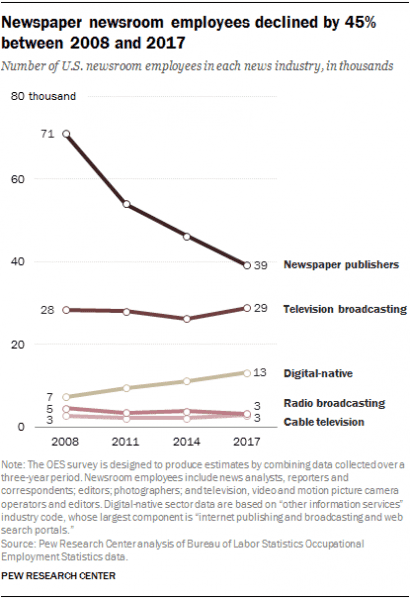
One of the ongoing agonies of being a journalist is that aspiring journalists frequently write you and ask for advice: “What would you say to a young journalist starting out? How do I break into journalism?”
I call it an agony not because it’s an annoyance, not because there’s anything wrong with it, not because I don’t admire people with the pluck to reach out for help — I do! The agony is that I don’t know what to tell them.
The industry is not in good shape. Local journalism is dying. The online media industry is still driven by ad sales, which means by traffic, which means there’s still constant pressure to resort to quick, identity- and outrage-based content. Digital media outlets are getting bought up or shutting down. It’s difficult to find support for serious, in-depth journalism and it’s difficult to make a living as a journalist.
So when I get these requests, I read each one a half-dozen times, agonize over what to say, and then eventually forget about them until they vanish into the second page of my inbox. It’s not ideal.
So my new strategy is: I’m going to write this post. Then I’m going to send all advice seekers to it.
Hello, Advice Seekers! Welcome to my advice post. I do have some broad advice, but not much of the specific kind. Here we go.
Advice I cannot give
First, in terms of practical advice — who to contact, how to assemble clips, how to find jobs — I know nothing. I kind of sneaked into journalism. I studied philosophy for many years as a grad student, dropped out, wound up in Seattle, and was hired on as an editorial assistant at Grist.org (a nonprofit for environmental journalism) in late 2003. I was more or less left to my own devices, worming my way eventually into full-time writing, which I did until 2015, when Vox asked me to come on board.
It’s a somewhat idiosyncratic path, and I don’t know that there’s much to learn from it. All I’ve ever done, from college up through now, is write nerdy explanations and arguments. It’s all I know how to do. And I plan to do until they boot me out into the street and I turn to mooching off my wife’s income full-time.
In the meantime, I don’t know who’s hiring or how to get jobs, so I’m not much help.
Related
Careers
That said, if a child of mine were determined not to pursue (or to abandon) a remunerative career that might fund my retirement, and were determined instead to pursue journalism, here’s what I would tell them.
Explainer journalism, explained
One of the central insights that led Ezra Klein to found Wonkblog at the Washington Post and then, with Matt Yglesias and Melissa Bell, to found Vox is that journalism in the late 20th and early 21st century was constrained on the supply side, and that shaped many of the professional practices and social norms around it. (Speaking of Klein, here’s his advice for journalists.)
As a simple economic matter, the medium itself was constrained: It takes money to print things on paper and distribute them to newsstands. But the supply of information was also constrained. If you wanted to look up a fact, you had to go to the library or dig through files at some government office. Journalism was labor-intensive and thus also expensive. Operating and labor costs were both high.

The internet changed all that. There are no longer supply constraints — it is trivially cheap and easy to publish something on the web — and there are virtually no constraints left on the supply of information. Libraries are online. Government records are online. Every public figure’s every move is blogged or tweeted.
Two things follow. First, with supply constraints gone, there is no reason to confine web journalism to the length and formal constraints of journalism developed for paper. Any story can be as long as it needs to be, whether it’s 200 words or 2,000. Not every journalist must choose between the view-from-nowhere voice of the objective journalist and stale aphorisms of major newspaper editorial pages. There is room for a greater variety of length, form, tone, voice, and subject on the web.
And second, there’s more need for explanation. Because they were supply constrained, newspapers and newspaper journalists focused on what was new, what just happened, the incremental development. But lots of times, readers had no way of making sense of those developments or contextualizing them. They were getting the leaves, but they’d never gotten the trunk.
Especially as information and incremental developments explode in quantity, there is increasing public hunger for understanding — not so much what happened, but what it means.
The great question of our age is simply, WTF? WTF isn’t asking after what happened. It’s easy to find out what happened these days. Rather, it’s pointing at what happened and asking, well … WTF?
What’s the deal with that? How does it work? How good or bad is it, really? How does it connect with these other things? What can we learn from its history?
People want to know how the world works. They want to know why the things that are happening are happening. They don’t stop wanting to learn when they get out of school.
So journalism is inevitably shifting. These days, it is less about producing new information than it is about gathering information already on the record, evaluating it, and explaining and contextualizing it for an audience, perhaps with some analysis and argumentation for good measure.
Don’t get me wrong: There’s still plenty of information to be dug up. Investigative journalism still very much exists, though it is under-funded everywhere. I look on it with great admiration and some awe, but it’s not what I do. And though many are loathe to admit it, it’s not what most US journalists do these days.

Most journalists are, whether they think of themselves this way or not, explainers. They are in the business of making sense of the torrent of information constantly deluging us all.
That obviously can and does include an enormous range of journalists and an enormous range of voices, formats, and subjects. Some journalists prefer the “objective,” distanced tone that marked most journalism in the late 20th century. Some prefer to have a distinctive voice and perspective. Some prefer to focus on daily developments, others prefer to step back and analyze trends.
And there are many voices in between, many legitimates subjects on which to focus, many valid media in which to work. As I will argue later, none of those choices are what separate good from bad journalists. My advice is to find the subject and voice that feel authentic to you and don’t worry too much if it fits in an established model.
The internet offers freedom, but remember that freedom is a double-edged sword. You can do anything, adopt any voice you like, investigate anything you want, but that lack of constraints is a constant invitation to indulgence. You (and your editors) must impose your own constraints, maintain your own discipline, and keep your focus on the needs of the audience.
The good and bad news about internet journalism
There’s good news and bad news about journalism on the internet.
The good news is, it’s fairly easy to become a journalist.
I used to hate-watch Aaron Sorkin’s show The Newsroom, a sappy paean to network TV news, and I would laugh when they panned back to show shots of the newsroom itself. It was just a bunch of people on computers and telephones.
Guess what? You can Google stuff and call people too. You don’t need to go to journalism school. There’s no necessary badge or accreditation (at least in most circumstances). You can just identify yourself as a journalist and start doing it. Call someone. Read a new report. Go see something. Figure out WTF is going on with some subject, explain what you learned, and publish it on the web. Voila — you are a journalist.

It’s not that there are no unique skills involved. There are. But experience teaches them a hell of a lot faster and better than journalism school.
Your goal is to get good at gathering facts, perceiving patterns, and telling stories. And the way you get good at that the same way you get good at anything else — by doing it a lot.
The bad news is that, while it’s easy to become a journalist, it’s very difficult to make a living as a journalist. It is becoming more challenging all the time to accumulate the two things a journalist needs most: trust, and money to pay the damn rent.
Jobs in US journalism have been on the decline, with the rise in digital journalism failing to keep pace with the loss of newspaper jobs.

And the jobs that do exist are still staffed disproportionately by a mostly white “elite” who went to a few high-end colleges.
The internet has not, contra its early advertising, done away with gatekeepers or created an egalitarian meritocracy. It has simply enabled new gatekeepers — the fickle billionaires who buy and sell media properties, the social-media companies who hold traffic and readership in their hands, the ad networks whose power dwarfs that of any individual media outlet.
It can be difficult to find paid work if you’re not already in the right circles. (Same as it ever was.)
On top of that, America is experiencing an epistemic crisis, and with that has come a crisis of authority in journalism. Ideological camps live in different worlds served by different media. Articles bounce around social media, one as plausible-looking as the other, unverifiable or bunk news mixed in with the real stuff, and no one knows what (or who) to believe.
The single most important currency in journalism is trust — to be seen as a signal amid the noise. And trust is in short supply these days.
Nonetheless, all that said, an aspiring journalist cannot single-handedly control industry trends or defeat structural forms of discrimination. There are all sorts of things they can’t control. Just about the only thing an aspiring journalist has direct control over is the quality of the work. So my advice is: Try to do good work.
How to be a good explainer journalist
1) Learn about something
There are many ways to do journalism, many voices and styles to adopt, many subjects to focus on or media to work with. Journalists come in all different flavors.
But the rarest creature of all, in this age as in all ages throughout history, is someone who knows what the fuck they are talking about.
It might seem paradoxical that, though the amount of available information continues to increase exponentially, most people remain ignorant about most things. But it isn’t, really.
People have limited emotional and cognitive bandwidth (and there’s no app to expand it). They have lives. They are busy. They learn about stuff relevant to their families, jobs, and hobbies, and not much beyond that. Even those eager to learn can only hope to keep up with a few subjects on their own.
There’s nothing wrong with any of this; it is true of all of us. But the upshot is that, for any given subject, it is fairly easy to learn more about it than most people know.
I think of knowledge on most subjects as a logarithmic curve that rises quickly at the far end. On a given subject, 90 percent of people know virtually nothing. Maybe 7 or 8 percent of people know a decent amount, 2 percent know a lot, and maybe 1 percent are deeply expert. (I’m making these numbers up, but you know what I mean.)

There are exceptions, of course — on certain concentrations of attention like national politics or Star Wars movies, lots of people know everything there is to know, quickly. But in between those peaks are huge valleys of knowledge that are simply lost in mist to the vast majority of people.
Developing a reasonable expertise in something, from US-China relations to renewable energy to school desegregation to fashion trends in Italy to terraforming Mars, requires no magic or secret guild training. It just requires sustained attention, like anything else — putting in the hours. Most people don’t.
If you become known as a person who knows a lot about something and who can explain it well, you will find a niche. There are all sorts of trade journals and specialist publications these days where you could get your start. But you don’t have to wait for a job. Learn, and share what you know. Become useful, even if only to a small community. Useful people are rare.
From that niche, you can spread out. But the surest way to get a foothold is, on at least one thing, to know what you’re talking about.
2) Network, but don’t “network”
Psychologists will tell you that the best way to be happy is not to pursue happiness directly. It should be a side effect of a life lived with purpose. So too with networking.
You should be interested in your subject. If you are, you will seek out people who know more than you and learn from them. You will share what you know with people who want to know more. You will trade stories with people engaged on the same subject. As a side effect, you will network. Let your curiosity be your guide.
The people who have come to my favorable attention over the years have done so because they ask smart questions, or point to information or sources I hadn’t seen, or connect me with other useful people. Whatever their roles or intentions, they know and care about the subject matter; they want to learn and they want to share what they know.
The same basic principle applies to social media, which is, regrettably, still a great way to get your name out there. (I say regrettably only because it is also destroying society.)
Remember: Useful people are rare. Being useful on social media — stimulating good-faith discussion, offering relevant information, providing fresh analysis — is rarer still. The people I notice and follow on Twitter don’t necessarily have blue checkmarks or big follower numbers. It’s just that they keep popping up, having something relevant and interesting to say — being useful.
3) Be diligent, humble, fair, and try to write well
There are all kinds of debates about journalism these days, about “bias” and whether journalists ought to have opinions or share them, and what kinds of standards real journalists ought to follow. Much of it is BS. I spent too long studying philosophy to ever believe that any of us can escape our presuppositions or that it’s possible to present facts — at least facts that matter to human societies — without our presuppositions shaping and framing them.

We see the world a certain way, and not other ways. We cannot escape being human. Pretending to do so only leads to a bunch of awkward, brittle conventions that conceal as much as they reveal.
In my estimation, the values that matter in journalism are somewhat more old-fashioned: diligence, fairness, humility, and craft. (And yes, I have transgressed against all these values over the course of my career. Who among us, etc. etc.)
The most important thing for anyone writing about any subject — and I really can’t stress this enough — is knowing what the fuck you’re talking about.
That takes diligence: being the one who reads the whole report, the one who checks the appendix, the one who makes the extra call, the one who gets some extra background from podcasts or recorded lectures while doing the dishes or walking the dog.
Knowing more about a subject does not solve everything. Plenty of people learn more only to better serve their priors. There’s even a name for it: “motivated reasoning.” I’ve encountered many, many climate deniers who know far more about climate science than most people. They are like lawyers, gathering information to make a case they took on long ago.
But knowing more makes everything else easier. It makes you vastly more likely to be useful. And there’s no way to know more other than to be diligent and keep at it.
Then there’s fairness, which is what I think most people (of good faith) are grasping at when they talk about “bias.” One thing you notice when you learn more about a subject is that it’s more complicated than you thought it was — for any value of “it.” There’s always more to it than you thought, no matter how much you thought before you started looking.
Though social media might lead you to believe otherwise, there are ambiguities and good-faith arguments to be found in and around any subject. Even on matters where you think the correct answer is obvious, you will understand the answer, and your own thinking, much more clearly if you understand the best argument for the other side.
Fairness does not mean refraining from conclusions. (What are you being paid for, if not to look into things and figure them out?) But it does mean doing your best to get in the headspace of a reasonable opponent, trying to articulate the best argument against your conclusions.
And it means acknowledging doubt and uncertainty. Which brings us to humility.
Humility is perhaps the most difficult thing of all in the social media age, which endlessly rewards the sharp, clear take, the one that might go viral.
I’ve written plenty of those myself — hundreds! — and obviously don’t see anything wrong with it. The key, in journalism as in any truth-seeking pursuit, is to try your best to keep all your beliefs and conclusions at arm’s length, at least somewhat provisional. Don’t get your identity mixed up with your beliefs or you’ll end up defending them come what may.
Even if you get above the 90 percent knowledge threshold on a subject, there’s plenty of climbing to do, and each increment gets more steep. We are all of us in this business dancing at the edge of what we know, so it pays to be open to correction or revising your conclusions.
That is, of course, easier said than done. I’ve changed my thinking on plenty of things over the years, but not always with grace. Listening and being willing to revise your beliefs is rarely rewarding in the short-term, especially give the tribal incentives of social media. But it is worth it in the long run. You will be more interesting and more useful, for longer, if you cling to your curiosity and humility.
Finally — and here I will definitely start sounding like an old man — there is craft. It is a lamentable fact of modern journalism that there are fewer and fewer venues or opportunities for “slow journalism,” i.e., carefully assembled, edited, and fact-checked work. Taking time, doing the legwork, going through multiple drafts, fact-checking, it all costs money, and in an economy that rewards clicks, few outlets can afford it.

When I wrote a piece for Outside magazine a few years ago, we went through probably 50 drafts all told, making increasingly fine-grained changes. For a piece of day-to-day web journalism, it’s generally two drafts, three at most, sometimes just one. It’s all speed and triage these days, doing as well as possible in the short time allotted.
But still: Words matter. And good writing always outs.
Caring about craft does not necessarily mean writing in stuffy New Yorker voice (not that there’s anything wrong with that). I always think about Lindy West, the feminist journalist who got her start here at Seattle’s local alt-weekly, the Stranger, writing in an utterly idiosyncratic voice that involved frequent ALL CAPS for emphasis. It was nobody’s house style, not even the weirdos at the Stranger. But it was good — funny, observant, and sharp. And her audience found her.
For my part, I’ve always taken a somewhat informal tone, balancing facts and analysis with jokes, polemics, and the occasional picture of a cute animal. When I’m writing, I like to imagine I’m talking with a friend at a bar (a curious friend, but not a friend with endless patience). I try to be engaging, to vary my pitch and tone and the length of my sentences, to intersperse serious or technical passages with bits of levity, to coin the occasional evocative phrase. I try to be accurate, yes, but I also try to be interesting, because either without the other does a disservice to my friend.
Whatever your tone or approach — objective reporter, storyteller, wry commentator, nerdy explainer, table-pounding polemicist — it is possible to do it well or poorly. So much writing on the web these days is mush, of low-to-middling nutritional value. Writers (and editors) who take a little extra time to make their writing more useful, economical, and (hell, I’ll say it) beautiful are showing that they care for the reader’s time. It gets noticed.
Advice in a time of chaos
So, Advice Seekers, that’s what I’ve got. I can’t tell you what to do on Monday morning, who to email or what to pitch, but what I know — or at least believe, or at least hope, or at least sometimes hope — is that even in this crazy age of “fake news” and information junk food, when everyone has retreated to tribal borders and no one trusts anyone, there is demand, and an audience, for quality.
People are genuinely curious. They want help making sense of the thicket of information that surrounds them. Vox’s success, and the broader success of explainer journalism, is a testament to that fact. There is a bottomless public hunger for in-depth understanding. People crave and appreciate it — not everyone, but enough people to sustain an audience. Vox wouldn’t be letting me publish a 6,000-word explainer on power grid architecture if it hadn’t learned that lesson again and again.
Professional insider journalists sometimes mock the explainer conceit, as though it is arrogance or pretense, but they are missing the point. Journalists are those society has charged with figuring out WTF is going on and explaining it to everyone else. It’s not arrogance to take that on. You don’t have to be smarter than anyone else, or have any special credentials. You just have to be willing to put in the hours. It’s work — honorable work, a sacred public trust, but in the end, just work.
There are many different ways to do good journalism, but there is no way of becoming a good journalist that does not involve learning, trying, and practicing: doing the work.
Learn a lot about something. Practice sharing it with people in an engaging way. Find and occupy a niche. Then learn more, share more, expand your niche, and keep on learning. Good luck.
Sourse: vox.com






